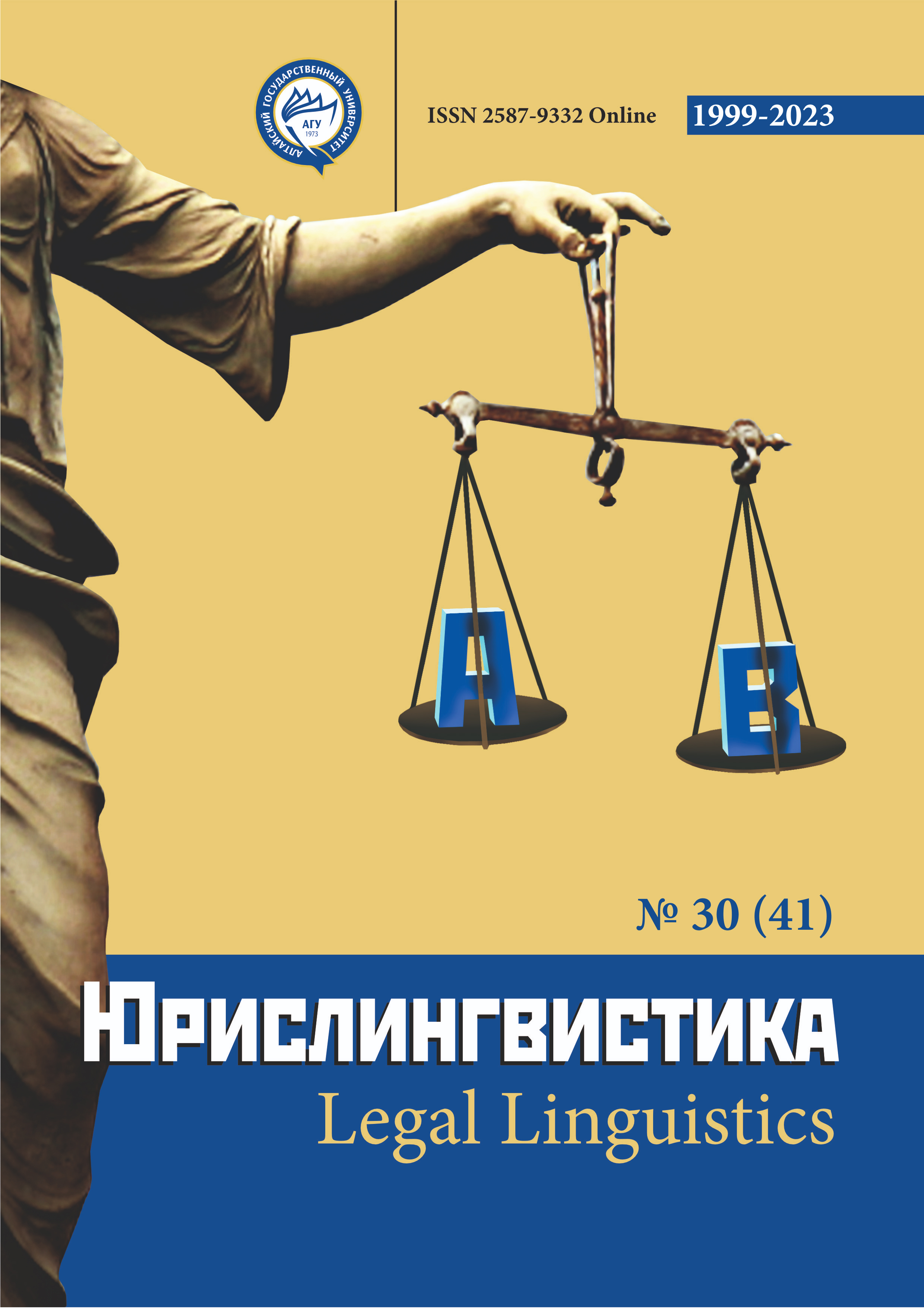Considering the Factor of Ignorance in Linguo-Criminal Texts
УДК 81`33, ББК 81
Abstract
The article considers the problem of ignorance and resulting misunderstanding in texts that are the objects of forensic linguistic expertise. The authors of linguo-criminal texts may use set phrases that have become memes, but it can be difficult to determine whether they are real citations. Misunderstanding of words and phraseological units is often explained by the fact that the speakers are detached from Soviet reality, including Soviet cultural realia. Soviet people understood them, either from their own experience or from works of literature and art (performances or films). The author may be aware of a quote, but not know its origin and real meaning. In such cases, careful contextual analysis of the utterance is necessary. In addition, the expert must take into account linguistic factors: firstly, a certain quotation is reproduced in a standardized or free form, and secondly, this phrase is rigidly or freely specified according to the rules of syntax. The semantics of some words can be understood only after reference to dictionaries, but there can be no certainty that the author of the text meant this. Many words are polysemantic, and their true meaning is not always shown in the context.
Downloads
Metrics
References
Баранов А. Н. Лингвистическая экспертиза текста. 2-е изд. М., 2009.
Большой толковый словарь русского языка. / Гл. ред. С. А. Кузнецов. – Первое издание: СПб., 1998. – Публикуется в авторской редакции 2014 года. URL: http://gramota.ru/slovari/.
Винокур Т. Г. Говорящий и слушающий. Варианты речевого поведения. М., 1993.
Грачев М. А. Словарь современного молодежного жаргона. М., 2007.
Грищенко А. И., Николина Н. А. Экспрессивные этнонимы как приметы языка вражды / Отв. ред. И. Т. Вепрева, Н. А. Купина, О. А. Михайлова. Язык вражды и язык согласия в социокультурном контексте современности. – Екатеринбург, 2006.
Даль В. И. Толковый словарь живаго великорускаго языка. URL: http://slovardalya.ru/
Ефремова Т. Ф. Новый словарь русского языка. Толково-словообразовательный. М., 2000. URL: http://traduko.lib.ru.
Жданов Ю. А. Избранное: в 3 т. Ростов-н/Д., 2009. Т. 2.
Карасик В. И. Язык социального статуса. М., 2002.
Коробкова О. С. Маркеры языка вражды в номинациях этнической принадлежности: социолингвистический аспект / Изв. Рос. гос. пед. ун-та им. А. И. Герцена. – 2009. – № 111.
Маркс К. Передовица в №179 «Kölnische Zeitung» / Маркс К., Энгельс Ф. Соч. – Изд. 2. – М., 1955. – Т. 1. – С. 93-113.
Милославский И. Г. Морфологические категории современного русского языка. М., 1981.
Национальный корпус русского языка. URL: https://ruscorpora.ru/new/
Словарь молодежного сленга. URL: https://teenslang.su/id/1912
Searle J. R. What is a speech act? / Philosophy in America / ed. Max Black. London, 1965. – P. 221-239.
Copyright (c) 2023 Александр Флоря

This work is licensed under a Creative Commons Attribution 4.0 International License.
The authors, which are published in this journal, agree to the following conditions:
1. Authors retain the copyright to the work and transfer to the journal the right of the first publication along with the work, at the same time licensing it under the terms of the Creative Commons Attribution License, which allows others to distribute this work with the obligatory indication of the authorship of this work and a link to the original publication in this journal .
2. The authors retain the right to enter into separate, additional contractual agreements for the non-exclusive distribution of the version of the work published by this journal (for example, to place it in the university depository or to publish it in a book), with reference to the original publication in this journal.
3. Authors are allowed to post their work on the Internet (for example, in a university repository or on their personal website) before and during the review process of this journal, as this may lead to a productive discussion, as well as more links to this published work (See The Effect of Open Access).











